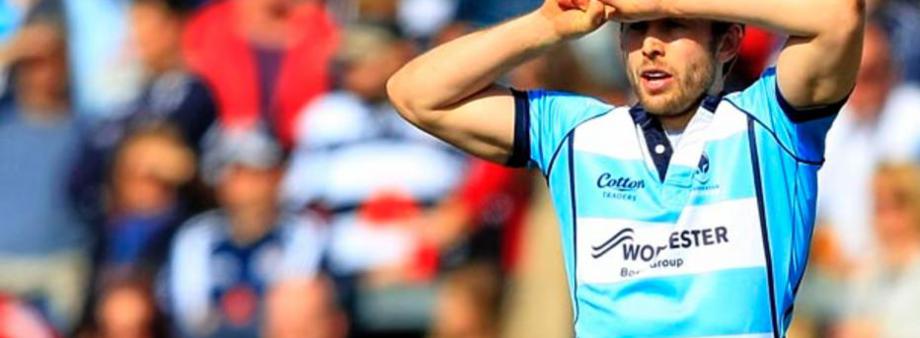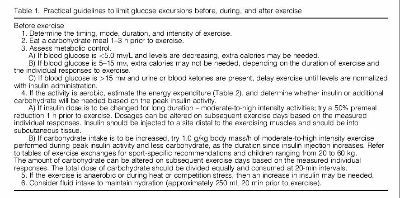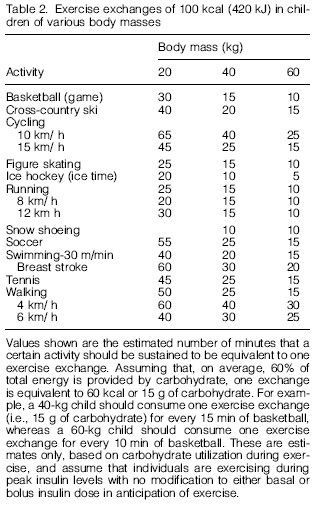
Carbohydrates
Carbohydrate
intake is important during prolonged exercise to maintain glycemia and
is also needed after exercise to replace depleted liver and muscle
glycogen stores. Endogenous (i.e., muscle and liver glycogen) and
exogenous (i.e., ingested) carbohydrates are oxidized at high rates
during exercise in healthy and diabetic children and are the sole
energy source for cognitive functioning. It is generally recommended
that carbohydrate should be 60% of the total daily caloric intake, with
the majority in the complex form (e.g., whole grains, beans). These
lowglycemic foods limit postmeal hyperglycemia and elevated needs for
insulin. Although recommendations are not readily available for active
children with diabetes, endurance athletes should consume approximately
8-10 g CHO/kg body weight/d. The amount of additional carbohydrate
needed for exercise will vary according to body size and the intensity
of the activity (see Table 2). A healthy daily diet should also include
12-15% derived from protein (preferably from lean meats and vegetable
sources) and approximately 25-30% from fat, with no more than 10%
obtained from saturated sources (e.g., animal fat).
The total
amount of carbohydrate needed for exercise should be as close as
possible to the estimated carbohydrate expenditure for the given
activity and body mass (Table 2) However, these tables are only
guidelines, and individual blood glucose responses to exercise and
carbohydrate intake vary considerably among children and adolescents.
In addition, less carbohydrate may be consumed if individuals wish to
lower blood glucose toward euglycemic levels. It is important that a
low glycemic bedtime snack be provided to help limit nocturnal
hypoglycemia.
Table 1. Practical guidelines to limit glucose excursions before, during, and after exercise
Table 2.
A meal containing carbohydrates, fats, and protein should be consumed roughly 3-4 h prior to competition to allow for digestion and for a maximizing of endogenous energy stores. Glycogen stores can be enhanced with a carbohydrate beverage (1-2 g CHO/ kg) approximately 1 h prior; this also helps to supplement energy stores and provide adequate fluids for hydration. A beverage containing 6% simple sugar (i.e., sucrose, fructose, glucose) provides optimal absorption compared with other more concentrated beverages such as juice or carbonated drinks that delay gastric absorption and cause stomach upset. Nutritionally complete snacks that contain fat and protein may be effective in preventing late-onset postexercise hypoglycemia if they are consumed immediately after the activity .
In general, approximately 1.0-1.5 g CHO/kg body weight/h should be consumed during exercise performed during peak insulin action in young adults with diabetes. As mentioned above, tables of exercise exchanges that estimate carbohydrate utilization may be helpful in determining the carbohydrate intake regime for younger individuals. To treat hypoglycemia, 15 g is recommended and a retest of blood glucose level is needed prior to resuming exercise. Carbohydrates are not only required for energy during activity but also to replace the energy derived from liver and muscle glycogen stores. Because insulin sensitivity remains elevated for hours postexercise, carbohydrate stores must be replenished quickly to lower the risk of hypoglycemia during the first few hours postactivity. For patients who tend to experience postexercise, late-onset hypoglycemia during the night, a complex carbohydrate (e.g., uncooked corn starch), or a mixed snack containing fat and protein may be particularly beneficial at bedtime. Fluid requirements have been extrapolated from adult needs and are estimated to be approximately 1.6 L/d for basic requirements and an additional 0.5-1 L/h of vigorous physical activity. In warmer environments, fluid requirements are higher for youth as they experience greater heat accumulation and they perspire less than adults do. Those with diabetes may be at particular risk because a prior bout of hyperglycemia reduces body fluid levels.
A meal containing carbohydrates, fats, and protein should be consumed roughly 3-4 h prior to competition to allow for digestion and for a maximizing of endogenous energy stores. Glycogen stores can be enhanced with a carbohydrate beverage (1-2 g CHO/ kg) approximately 1 h prior; this also helps to supplement energy stores and provide adequate fluids for hydration. A beverage containing 6% simple sugar (i.e., sucrose, fructose, glucose) provides optimal absorption compared with other more concentrated beverages such as juice or carbonated drinks that delay gastric absorption and cause stomach upset. Nutritionally complete snacks that contain fat and protein may be effective in preventing late-onset postexercise hypoglycemia if they are consumed immediately after the activity .
In general, approximately 1.0-1.5 g CHO/kg body weight/h should be consumed during exercise performed during peak insulin action in young adults with diabetes. As mentioned above, tables of exercise exchanges that estimate carbohydrate utilization may be helpful in determining the carbohydrate intake regime for younger individuals. To treat hypoglycemia, 15 g is recommended and a retest of blood glucose level is needed prior to resuming exercise. Carbohydrates are not only required for energy during activity but also to replace the energy derived from liver and muscle glycogen stores. Because insulin sensitivity remains elevated for hours postexercise, carbohydrate stores must be replenished quickly to lower the risk of hypoglycemia during the first few hours postactivity. For patients who tend to experience postexercise, late-onset hypoglycemia during the night, a complex carbohydrate (e.g., uncooked corn starch), or a mixed snack containing fat and protein may be particularly beneficial at bedtime. Fluid requirements have been extrapolated from adult needs and are estimated to be approximately 1.6 L/d for basic requirements and an additional 0.5-1 L/h of vigorous physical activity. In warmer environments, fluid requirements are higher for youth as they experience greater heat accumulation and they perspire less than adults do. Those with diabetes may be at particular risk because a prior bout of hyperglycemia reduces body fluid levels.



